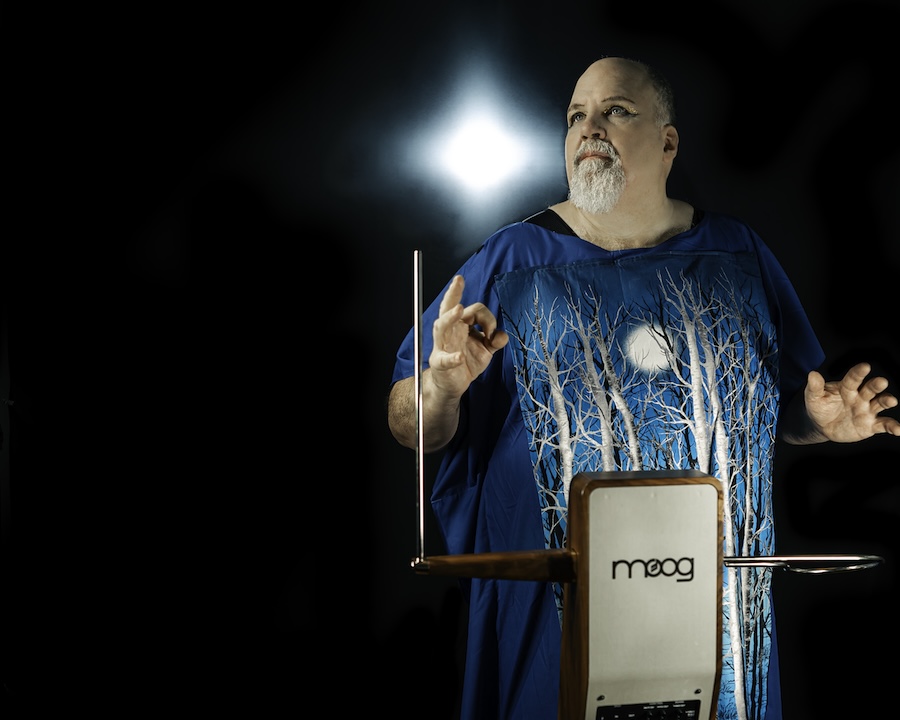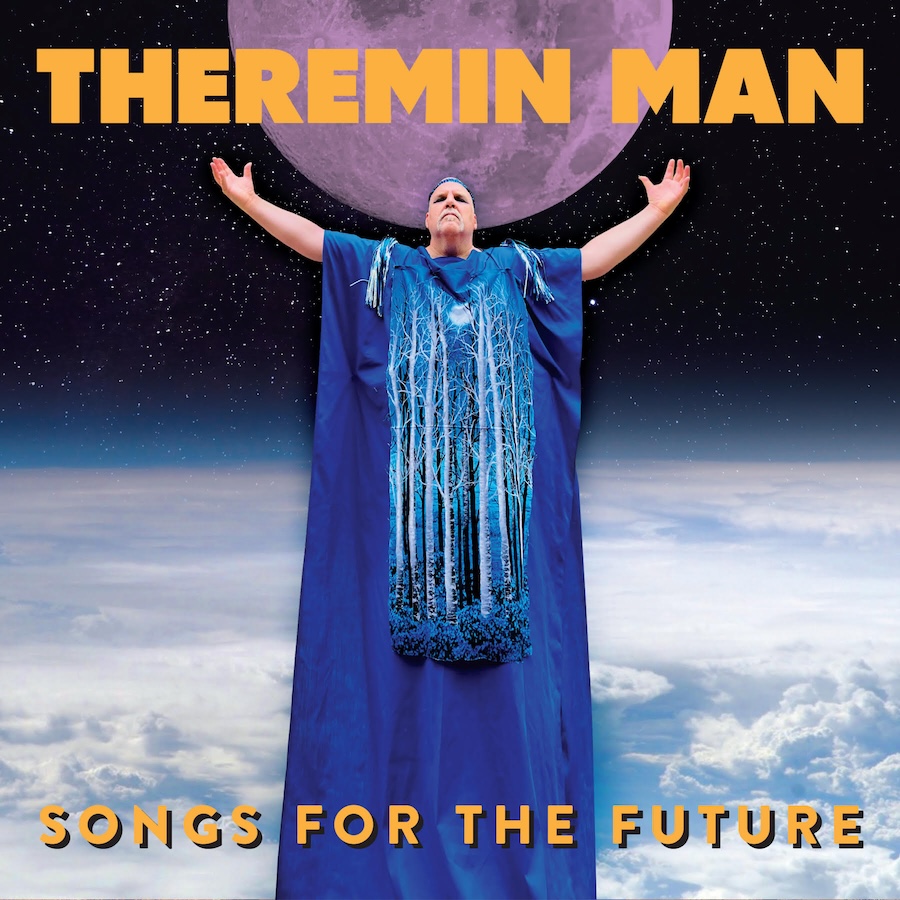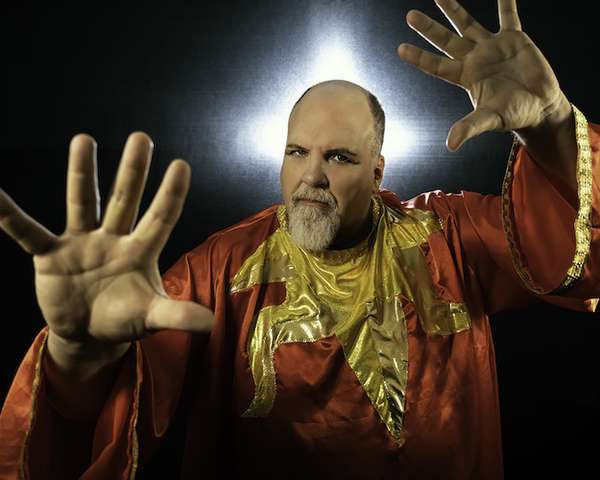Stephen Hamm might be best known as Slow's bassist in some circles.
Slow’s Against The Glass was voted the 17th best Canadian LP ever. Further, the lead single “Have Not Been The Same” was ranked the 10th greatest song.
Stephen has played in many different bands over the years (starting with Chuck and the Fucks -- yeah I just wanted to type that out) and Evaporators to name just a couple.
Stephen continues to explore and create and now has embraced the mysterious theremin. He is not one to go ankle-deep into cold Canadian lake water but take the full polar bear plunge into exploring and understanding the often misunderstood instrument.
I had the opportunity to speak to Stephen about his past, current and future endeavours. So climb aboard the Luna Rocket to Destination Moon and beyond. Captain Hamm is at your service. No wakka lakka here!
Scene Point Blank: So how are things in Vancouver?
Stephen Hamm: It's sunny today. I don't know if you ever spent winter on the West Coast but it’s wet and grey!
Scene Point Blank: Oddly enough, I've seen more of the States and Europe than I have of Canada. We did look at going to Vancouver one time and it was the same price to fly to Vancouver as it was to go to Paris…So we said, “Well, we're going to Paris!” I really should head out and see more of Canada at some point, we're such a vast land.
Stephen Hamm: No kidding. It's a real outpost out here, which affects it. I mean, we're really at the edge of the continent kind of thing. So, it's a little bit of the Wild West in its weird way.
Scene Point Blank: I always found that you would get all the California bands and we get all the New York bands in Ontario. I am sure you experienced that as well playing with Slow. I was always kind of jealous about some of the bands that Vancouver was getting. Mind you, they were jealous of the bands that we were getting from New York, I guess.
Stephen Hamm: Yes and the bands that Winnipeg were getting were from Minnesota. I do remember that. The Replacements are touring. I'm talking, you know, like back in the early, mid ‘80s. We were like, “Why don't The Replacements ever come out here?” Husker Du would make it out every once in a while because they were on a continental touring circuit.

Scene Point Blank: Winnipeg had quite the scene, at one point with bands like Personality Crisis, Stretch Marks, Beach Mutants etc. Did they ever make it out to Vancouver?
Stephen Hamm: Yeah. I think Personality Crisis did. I’m buddies with Richard Dugay, so I'll ask him. I think they made it to Vancouver and then eventually they never left, which I think was kind of their demise!
Scene Point Blank: He just released a record not long ago on Cursed Blessings Records.
Stephen Hamm: Yeah, he is releasing records again. So that's good.
Scene Point Blank: So I did some homework on the theremin. I went down a little bit of a rabbit hole with that. I saw Peru Ubu once and they utilized one. I had always heard about them; however, after seeing them used, I wanted to go out and get one.
Stephen Hamm: Yeah, that happens to a lot of folks. That was kind of what happened to me. The theremin was always kind of in the back of my head or mind. I remember when I was a wee young lad seeing The Song Remains The Same and Jimmy Page played one in that footage.
Scene Point Blank: I believe he utilized one mostly for live performances.
Stephen Hamm: Well, it shows up a little as a sound effect on “Whole Lotta Love” but, yeah, it was more utilized in live performance. I remember being 12 years or 13 and thinking, “What is that?” I was taken in by it but had no real idea what it was. But I thought it was very cool. It then sat in my psyche for years. It wasn't until I saw John Spencer using one a lot with the Blues Explosion that I went “Oh yeah, this thing!” It rekindled my fascination with it all over again.
I think it is a very good way to enhance your performance like how Spencer was using it. I'm into theatrics and always have been. The show is very important to me. It wasn't until I saw Armen Ra opening up for Grinderman at The Commodore and how he used the Theremin as a melodic instrument. It was the first time I had seen one used in that fashion. I was completely floored and that is what inspired me to go out and get one then embark on my journey.
Scene Point Blank: I saw that tour and I remember the audience going, “What the fuck! Who is this guy?”
Stephen Hamm: It was very innocuous. It was an odd performance because he just played by himself with backing tracks. Which is what a lot of us theremin players do. It was kind of a low key performance. I guess Nick wanted to bring something a little bit different along on tour, which is great. He was playing the classical theremin. After seeing that performance I went down the rabbit hole and wanted to know where the theremin came from, as well as what the inventor Leon Theremin envisioned and what he originally used the theremin as: which was a melodic instrument playing a lot of classical music ‘cause he was a classically trained cello player.
Scene Point Blank: I saw that footage of Leon playing the theremin and, as you stated, it was classical music. I think a lot of people have just used it to make those spooky sounds to enhance their music. I was surprised that The Beach Boys' song “Good Vibrations” is always touted as an example of theremin – however, this isn't accurate, as it is an electro theremin, which I believe is a derivative of an actual theremin.
Stephen Hamm: Yes, that is correct. There was a guy (Paul Tanner) who had wired up an oscillator so that he could play it melodically, with a big knob. You can find footage of Mike Love using it around 1968 or somewhere around that time. Mike would play it live, play that part live essentially.
Scene Point Blank: I had read that the person who invented the electro-theremin in the ‘50s was a trombonist. It’s all very fascinating with the history and such. Then you also had the claravox as well. I told you I went down that rabbit hole, as you said you did, haha.
Stephen Hamm: Yes, it is fascinating when you start drawing the parallels. Bob Moog started his whole career building mailorder kits with his dad in the basement and put himself through university. Of course, this led to the Moog synthesizer which has direct parallels to the theremin.
It's funny because whenever theremin is mentioned people always relate it to “Good Vibrations” or the Star Trek theme and both are not using theremin. It all adds to the mystique in a sense. That sums up the theremin in so many ways, haha!
Scene Point Blank: I was surprised to learn that Frank Zappa, Jean-Michel Jarre and Brian Jones utilized it at points, and Pere Ubu as I mentioned prior. These are all musicians who might be considered to push boundaries.
Stephen Hamm: Jean-Michel Jarre still uses it in his performance.
Yes, they push boundaries but are focused on their musical output as well. As I learn to play it melodically, I appreciate someone like Jean-Michel Jarre who plays it like it is supposed to be played. Zappa was an intense dude so he is one of those guys who, if he is going to use it, he is going to use it correctly. It isn’t the most accessible instrument, like a guitar for example.
Scene Point Blank: Are you one to want to explore different instruments? I interviewed Ivan Julian from Richard Hell and the Voidoids. He used an instrument called a bulbul tarang (which translates to “waves of nightingales”) on his last release, Swing Your Lanterns.
Stephen Hamm: Yes, definitely I am always exploring and have a great interest in all types of instruments and the sounds they make.
Scene Point Blank: It occurred to me that the theremin might be an instrument that would be accessible to someone, for example, who has a physical disability. I have worked in the field for many years.
Stephen Hamm: It is funny you mention that, as I am in the same field but more in the mental/cognitive disability field and had similar thoughts. I have had the opportunity to do workshops in elementary schools and found that very rewarding. I worked with a woman at a workshop who had a physical disability. She was quite disabled. Anyway, I let her have a go at the theremin and instantly you could see how her face just lit up. It was very rewarding in a sense. I agree musical therapists should incorporate the theremin into their arsenal of therapy. There is a therapeutic element to this instrument. Now I don't want to come off too wakka lakka when I say this [Laughs.] but you do become part of the instrument. From an engineer's standpoint, you are the capacitor. The space between your hand and the antenna depending on the distance changes the resistance from the circuit. So essentially your physicality informs the instrument even though you are not touching it. Your body mass, shape, water content, and the way you vibrate have a direct correlation to the instrument itself. It is a very interactive instrument.
When you asked me if I am interested in strange or different instruments it made me think that I am interested in new ways of creativity or how to inspire creativity. I had an act called Canned Hamm and, in a lot of ways, I can draw similarities. It was two guys who sang and danced or a sort of Vaudevillian mushroom trip. I was always interested in seeing people's reactions to the performance. The same holds true with the theremin performance. I find it to be a very positive experience or seen on a very positive level as people are generally highly engrossed in the performance and/or instrument. I hope it also inspires people to come at things at different levels or angles. It does that for me. When you see people interacting with it you can physically see the light bulb going on in their minds. Even when they are not playing it melodically, they soon realize that they can step out of their comfort zone and essentially become one with the instrument and it is not this fantastical mysterious instrument but quite accessible and available to those who want to pursue it.
Scene Point Blank: Sold! [Laughs.] I have always been interested in them and from, my research, they can be quite affordable. However, like anything, there is a big range in price.
Stephen Hamm: There is a level of accessibility and affordability. I will send you a link.

Scene Point Blank: When I saw Pere Ubu live I could see that they were feeling the music that they were putting out -- the theremin included. When you go to a live show you can tell when someone is just going through the motions and then you have someone like the Bad Brains who are projecting and feeling each note they play.
Stephen Hamm: The theremin allows me to access that level of musicianship like you mentioned when you saw Pere Ubu or the Bad Brains. There is so much music out there and a lot of posturing or musicians just going through the motions. However, when you see music at this level it is almost trance-like and hypnotic. This is the reason for me to create music and or art. There are not many times that you witness musicians doing it at that level. However, when you do it keeps you coming back for more. The theremin as an instrument demands your attention when playing it or listening to it. As a person who plays the theremin, there is a level of commitment as well.
Scene Point Blank: I have an album by a band called Lothar and the Hand People that is often cited as being one of the first rock bands to utilize the theremin. It has been some time since I have heard the actual LP but I don’t recall the theremin being front and centre. It is time now to dig that out and listen for it.
Stephen Hamm: Yes, that is a good idea I might go down that same rabbit hole and also listen to Pere Ubu as well. It would be interesting to see how they utilize it and if it is used up front and centre or as an instrument to supplement the overall sound.
Scene Point Blank: Were you involved with the Guinness World Book of Records where there was a whole slew of people playing the theremin at the same time? I think it was in Japan.
Stephen Hamm: Oh, yes, that happened in Japan and I believe it was 289 theremin players. There were relatives of Leon Theremin who attended. However, to answer your question: no, I was not involved with that, but certainly would have been interested in attending!
Scene Point Blank: Wow, that is impressive. It is almost some subculture of something that most people don’t know exists.
When Slow reunited in 2017, were you not in Paris studying the theremin?
Stephen Hamm: Yes, I was in Paris at the time when I got the call about Slow reuniting to do some gigs. Around that time I found myself not in a band for the first time in my life and, although it was refreshing in some sense, I found myself questioning what I wanted to do to keep that creative spirit flowing. So that, essentially, is how this journey started. At the time, I started this one-man band that primarily was focused on keyboards. I decided to see what else I had around the house and discovered or remembered having a theremin. I didn’t know really how to play it but decided to augment the sounds I was creating on keyboards by utilizing this instrument to the best of my abilities. The theremin, however, popped to the forefront and it demanded my attention. When I played it, I soon realized that people were drawn to it. It certainly beckoned or spoke to me that this is where I was going to focus on now.
I went down the theremin tunnel and I found people like Carolina Eyck. I discovered, pre-pandemic, a group of folks that meet every three months in Europe at a theremin academy. It usually consists of 12 to 15 people. Carolina will teach you theory and you can attend workshops and then go out for beers in the evening. So I went to the one in Colmar, France in August of 2017. I took lessons with Carolina Eyck for a week, so that is where I learned my theory. She is German so essentially you start with nothing and rebuild from there, haha. She didn't say that but, basically, it was like throwing everything out the window you think you know and let's start fresh. The approach was if you can play two notes in tune for 5-10 minutes we will move on from there.
Scene Point Blank: Is she considered a top gun in the world of theremin?
Stephen Hamm: Yes, she is considered one of the foremost theremin players. Her dad was some prog musician much like Jean Michell Jarre. I think she was 8 years old when he had her playing the theremin. There is also Lydia Kavina, who took lessons in Moscow when she was around 8 years of age as well. She is at the University of Oxford. Every Sunday a bunch of us get together on Zoom and take theremin lessons. It is a very small community, actually, and there are direct lineages back one hundred years to Leon theremin. Peter, his grandson, has a theremin school in Moscow.





